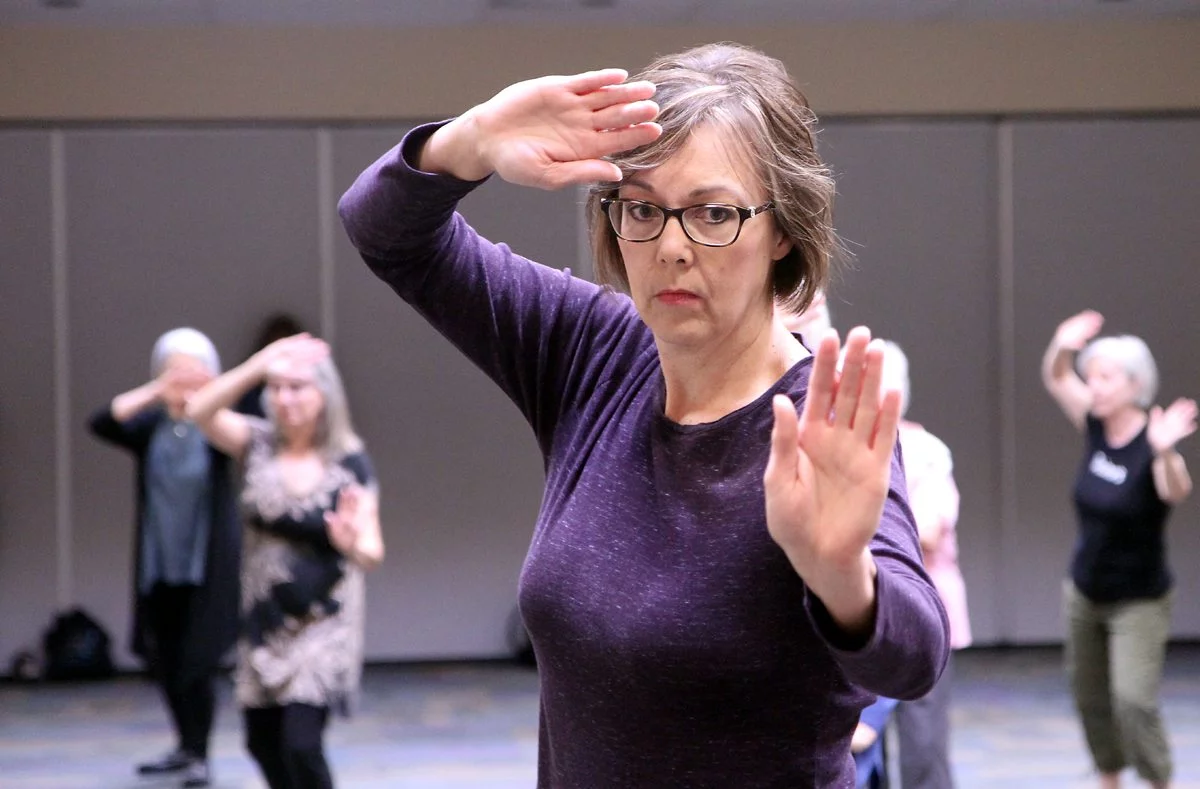Kelly Mireles may have found tai chi by chance, but that luck had nothing to do with how the ancient Chinese martial art form has changed her life.
Often referred to as meditation in motion, tai chi consists of gentle, physical exercise and stretches that flow one into the other, coordinated by breathing. First taught as a martial art and longevity exercise, it later became popular for its wellness benefits.
“It’s a fun, self-paced exercise that over time improves mobility, coordination and balance,” said Lee Bernhardt, a UCHealth physical therapist.
Managing pain

In 2011, Mireles had a spinal fusion to address a lower back condition called spondylolisthesis. She also has ruptured disks in her neck. Then a few months later, she had brain surgery to remove what would later be classified as a benign tumor. It was then that she started experiencing nocturnal seizures (seizures that happen during sleep), which led to daytime migraines. Her condition didn’t allow her to take walks alone, and it was during one of those walks with a friend that she learned of tai chi. Her friend’s husband was taking a class.
It’s been four years since Mireles signed up for UCHealth Aspen Club’s beginner tai chi class. She’s now in the advanced class, but more importantly, she feels better than she ever has before.
“When you get into that zone, you can feel the chi flowing,” she said.
Finding your chi
In Chinese, chi is defined as vital breath, vital energy, vital steam, gas or vapor; and every person has a different sensory experience of chi in their body, Bernhardt said. For Mireles, finding her chi has reduced her chronic pain and migraines.
People with pain tend to spend much of their time in a sympathetic internal state of the nervous system – a fight or flight state, Bernhardt explained. That state promotes more inflammatory processes in the body. And it perpetuates pain signals that contribute to what many people experience as chronic pain.
“By performing mindfulness practices such as tai chi and breathing exercises consistently, the goal is to create an internal state in our body that is less pro-inflammatory and more para-sympathetic, i .e., a less stressful and more relaxed internal state that is better equipped to manage daily stressors, our reaction to pain or stressful stimuli, and anxiety.” Bernhardt said.
In order to initiate this internal mindful state and fully benefit from this practice, you have to start with proper breathing techniques.
A focus on breath
“I had no idea that I didn’t know how to breathe right until I started taking tai chi,” Mireles said. “But once I learned that it comes from the belly [and not the chest], I could start to use my breathing outside of class on those really bad days.”
Diaphragmatic breathing helps us relax and become less resistant to movement and more resilient when encountering stress, both internally and externally, according to Bernhardt.
“By tapping into the nervous system [through diaphragmatic breathing] and decreasing stress levels in our bodies, we can become more aware of elements and actions that may be contributing to our daily stress levels [body posture, muscle tension, clenching of the jaw] and begin to better understand and control how we respond to these stressors with and within our bodies,” he said.
Mindfulness
“The most important piece to tai chi besides developing coordination and balance is mindfulness,” Bernhardt continued. “Mindfulness is how you tap into your nervous system … And when you do that, you start to realize not only what’s going on during your tai chi practice but what your body is doing in all your daily activities.”
Lee Bernhardt teaches tai chi at UCHealth’s University of Colorado Hospital in Aurora. People interested in taking a UCHealth tai chi class can find more information as follows: For the Colorado Springs area, visit the events page, call HealthLink at 719.444.2273 or email [email protected]; for the Denver-metro area, contact the rehab department at 720.848.2000; and for northern Colorado, contact UCHealth Aspen Club at 970.495.8560 or uchealth.org/aspenclub.
